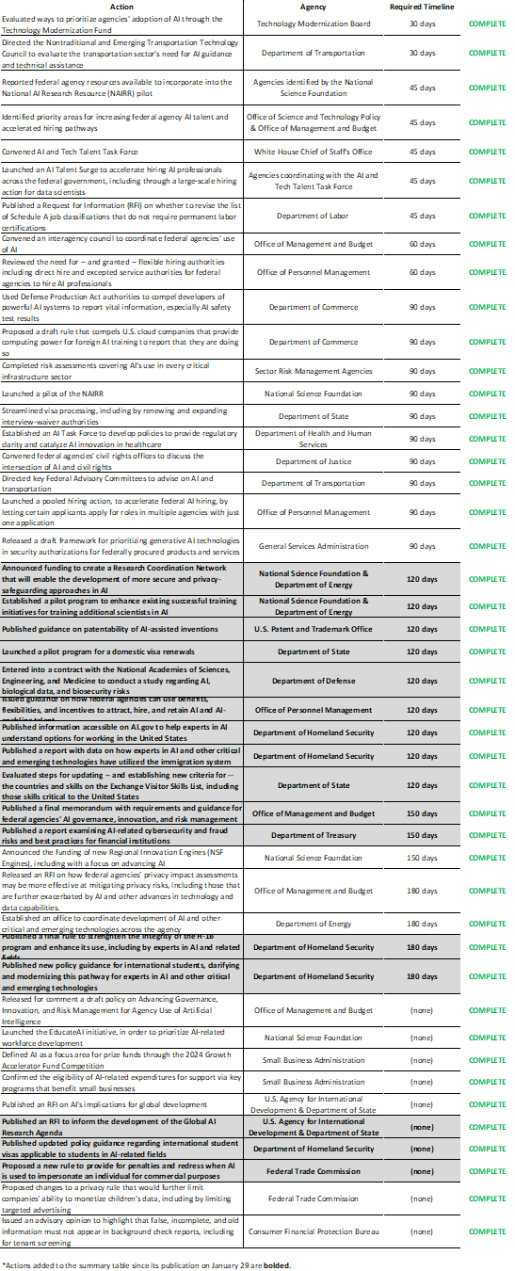| Speak to an Expert Today |
Introduction
In an era where artificial intelligence (AI) technologies rapidly evolve and permeate every sector, robust governance and ethical deployment are paramount. Recently, the White House issued executive orders targeting AI governance within federal agencies, outlined in the memorandum “Advancing Governance, Innovation, and Risk Management for Agency Use of Artificial Intelligence” (M-24-10). While these directives set forth comprehensive standards for federal bodies, their immediate implications for entities receiving Title IV funding, which are not federal agencies, are less direct.
These entities, which include a wide array of educational institutions, are currently not mandated to comply with these AI governance protocols. However, the standards established could inform future regulatory frameworks that extend to these organizations. Understanding these developments and preparing for potential future requirements is crucial, not only to ensure readiness for compliance but also to uphold the integrity and security of AI deployments.

Overview of the Executive Orders
Introduction to the Executive Orders
On March 28th, 2024, Vice President Kamala Harris announced the White House Office of Management and Budget (OMB) is issuing its first government-wide policy to advance governance, innovation, and risk management in federal agencies’ use of Artificial Intelligence. This announcement fulfills a core component of President Biden’s landmark Executive Order on AI, setting a precedent for rigorous AI governance within federal operations.

Chief AI Officer Requirement
The newly mandated Chief AI Officers (CAIOs) signify a major shift in artificial intelligence governance within federal agencies in the United States. These CAIOs are tasked with ensuring that AI technologies are implemented in alignment with ethical AI practices and federal directives. While this requirement currently applies only to federal agencies, it establishes a governance model that could influence standards across all sectors, including education. Title IV-funded institutions, while not directly affected by this mandate, may look to these developments as guiding examples for creating or enhancing their own AI governance frameworks.

Establishment of AI Governance Bodies
Alongside the appointment of CAIOs, federal agencies are required to establish or confirm AI Governance Bodies within 60 days. These bodies are essential for creating a unified AI governance framework that ensures ethical use and consistency across federal operations. This development is particularly relevant for educational institutions as it models how AI governance might be structured to uphold data privacy and prevent biases, providing a benchmark that Title IV-funded organizations could voluntarily adopt to pre-empt future regulatory expectations.

AI Governance Standards
The implementation of stringent AI governance standards in federal agencies focuses on protecting civil rights, ensuring privacy, and promoting equity. These standards aim to prevent adverse impacts such as biased decision-making and breaches of privacy. For Title IV-funded institutions, adopting similar frameworks can help exceed baseline standards and safeguard student interactions with AI-driven systems, aligning with best practices that may become benchmarks for future compliance.

Compliance Plans and AI Use Case Inventories
Federal agencies are now required to develop detailed AI compliance plans and inventories of AI use cases within 180 days, setting a path for transparent and accountable AI use. While Title IV-funded institutions are not mandated to follow these exact protocols, developing similar compliance strategies could be beneficial. This proactive approach would not only prepare them for possible future regulations but also demonstrate a commitment to ethical AI use. Managing Compliance through the evolution of policy is challenging for organizations looking to manage the complexity of compliance to the executive orders. Software applications provide a path to change management and implementation, organization-wide.

Timelines for Conformity
The executive orders outline clear timelines for federal compliance, with CAIOs and governance bodies to be established within 60 days, and comprehensive AI strategies and compliance plans developed within 180 days. These timelines highlight the urgency of adapting to new AI standards and the importance of ongoing updates to accommodate evolving technologies. While these timelines apply to federal agencies, they serve as a useful guide for Title IV-funded institutions aiming to stay ahead in AI governance and risk management.
CAIOs should be appointedwithin 60 days.
|
AI Governance bodies establishedwithin 60 days. |
Comprehensive AI strategies and compliance plans must be developedwithin 180 days.*
|
*with annual updates required to accommodate evolving technologies and regulations.
Implications for Title IV-Funded Entities: Preparing for Potential Mandates
Proactive Risk Management
Though not currently required, adopting the risk management and ethical guidelines suggested for federal agencies could benefit Title IV institutions by preemptively mitigating potential risks associated with AI use. Establishing voluntary compliance can protect privacy, ensure equity, and maintain the trust of stakeholders.
Strategic Alignment and Best Practices
Institutions should consider integrating the governance principles outlined in M-24-10 as best practices. Doing so can streamline operations, enhance data security, and prepare for any future mandates that might extend these rules to encompass all recipients of federal funding.
Voluntary Compliance as a Strategic Advantage
By voluntarily aligning with federal AI standards, Title IV-funded entities not only prepare for potential future regulations but also position themselves as leaders in responsible AI use. This strategic foresight can offer competitive advantages, such as attracting ethical partnerships and securing stable funding.
Conclusion
While Title IV-funded institutions are not currently required to comply with the AI governance standards set out in M-24-10, the landscape of federal regulations is evolving. Acacia Advisors is here to guide these organizations through potential future changes, ensuring they are not only compliant but also leaders in ethical AI deployment. By anticipating and preparing for these standards, institutions can safeguard their interests and enhance their educational missions.
| Speak to an Expert Today |
How Acacia Advisors Can Assist
Acacia Advisors provides strategic guidance to help institutions navigate the complexities of AI deployment and governance, even as current federal mandates do not directly apply. Our services ensure that organizations are not only prepared for today’s requirements but are also ahead of the curve for future regulations.
AI Strategy and Governance
Expertise in Strategy and IT Assessment
We offer expertise in developing AI strategies that align with both current best practices and potential future standards, ensuring institutions are well-prepared for any shifts in regulatory landscapes. Our team can help organizations implement governance frameworks that might soon become a baseline standard across the educational sector, fostering a culture of compliance and innovation.

Advisory Boards and Tailored Coaching
Through its Advisory Boards and Coaching services, we provides access to external expertise that can offer invaluable oversight and strategic guidance. These services ensure that AI deployments are not only compliant with new regulations but also ethically aligned and optimized for long-term success. This external perspective is crucial for maintaining governance standards and fostering an environment of continuous improvement and adaptation. By engaging with Acacia Advisors’ seasoned experts, institutions can enhance their governance practices and ensure their AI strategies reflect the highest standards of accountability and ethical consideration.

Talent Solutions for AI Readiness
Ensuring that the right team is in place to handle AI initiatives is critical for the success of any strategic undertaking. Acacia’s Talent Solutions are designed to help organizations find and integrate the necessary AI talent efficiently. From filling specific technical roles to enhancing overall team capabilities, Acacia Advisors assists institutions in building a workforce that is prepared to meet current demands and scale for future needs. This support is essential for maintaining compliance and staying competitive in a rapidly evolving educational landscape.

By engaging Acacia Advisors, organizations can confidently navigate the new requirements set by the executive orders, ensuring their AI strategies are compliant, ethical, and effectively integrated into their core educational missions. This proactive approach not only aligns with federal mandates but also positions these entities as leaders in the responsible and strategic use of AI in education.
Discover the Potential
Visit chooseacacia.com to uncover the possibilities of a tailored AI strategy that can propel your organization forward.

Begin Your Transformation Journey
Don’t let another moment pass in inaction. Contact Acacia Advisors today and lets start the conversation. Let’s explore together how to unlock new value for your business, enhance your operational efficiencies, and give you the competitive edge that you need in this digital age.
Your journey towards AI excellence starts with a simple step. Take that step with Acacia Advisors.
Contact Us Now
Embrace AI with confidence. Embrace it with Acacia Advisors.


